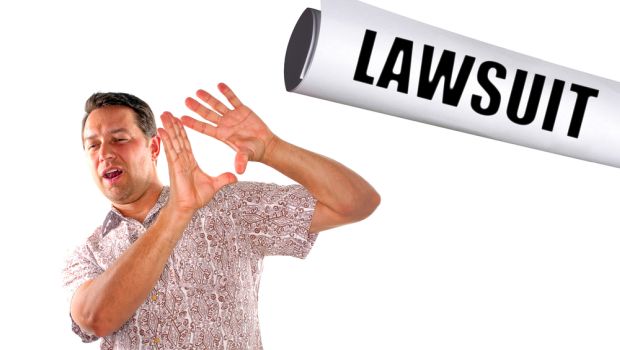Facing a lawsuit would send just about any self-storage operator into panic mode. Instead, follow these steps to help your attorney successfully defend your business.
January 17, 2018

Someone once told me that if a business owner isn’t getting sued, he must not be very successful. There’s some truth to this. If your business is around long enough and grows big enough, the risk of facing a lawsuit does increase. This is certainly true in an industry like self-storage.
So, if it happens, what do you do? Here are some simple steps to increase your success rate, lower your heart rate and, hopefully, cut down a little on your attorney's billing rate.
You Got Served
It's 3:30 p.m. and you’re looking forward to wrapping up another successful day of renting units, collecting payments and satisfying tenants with your amazing customer service. Suddenly, a constable or other unknown individual walks in and says these horrifying words as he hands you a stack of papers: “You’ve been served.” Don't reach for the whiskey immediately; it’s not the end of the world.
First, don’t ignore the summons, as it won’t go away. The moment those papers hit your hand, a clock starts ticking, marching toward the time when your response is due to the court to avoid a default judgment. There may also be some very important motions—such one to dismiss the case—that are on a short timetable.
Notify Your Attorney and/or Insurance Agent
It’s vital that you immediately scan and e-mail or fax the documents to your attorney and insurance agent. Don’t delay even five minutes. Do it while it’s fresh and hot in your hands. This will give your lawyer or agent the most time to strategize the next legal move. Send it to your attorney even if you have insurance because it’s possible the nature of the suit is excluded from your policy (like a mold claim).
Save Everything
"There is a legal duty to preserve evidence when a party knows, or reasonably should know, that (1) there is a substantial chance that a claim will be filed, and that (2) evidence in its possession or control will be material and relevant to that claim." What does that mean? Simple: Save your stuff and don’t fire up the shredders. Send out an e-mail, letter or memorandum to everyone in your organization and let them know a lawsuit has been filed. Everyone should preserve all e-mails, documents, notes, files and evidence of any nature that relates to the person or entity that has filed suit.
In the self-storage context, make sure you save all e-mails, notices, letters, ledger notes, physical files, electronic files and documents, photographs, broken locks, videos, and anything else related to the tenant and the unit. If you want to really make your attorney happy, create a neat copy of everything and send it to him right away. Don't filter the pile, sifting out things you think are irrelevant; let your attorney decide that.
Destroying documents and evidence after a lawsuit has been filed, even unintentionally, can result in a horrible situation at trial. You don’t want to have to defend the facts of the case and your “destruction” of evidence as a simple mistake or normal document or e-mail purging. Best practice: Keep it all and send it to your lawyer.
Keep It Quiet
Now that you’ve entrusted the legal outcome of this controversy to your attorney, inform your staff and anyone else connected with the case that it’s time for them to stop talking about it. Do not write a Facebook post that reads, "Just got sued today by some crazy @#$%. WTF?" There should be no internal e-mails between your staff discussing how this tenant is a drug addict or crazy or anything else. Send all inquiries about the case from third parties to your attorney. Only talk about the case in the presence of your lawyer and let him handle it.
Whatever you do, don’t discuss the case with the plaintiff under any circumstances. If he shows up to "talk," let him know he needs to have his attorney call your attorney and politely end the conversation. Again: Don’t talk about it!
Be Responsive and Helpful
When your attorney calls with questions or needs other documents, be responsive and cooperative. This helps the case move forward. If circumstances change, let your attorney know. For example, if you need to fire the only employee with knowledge of the facts, maybe call your lawyer first to strategize around that decision.
Remember, most businesses face legal action of some type during their existence. We’re all human and occasionally make mistakes. Sometimes you’ll have a tenant who’s just plain crazy. Either way, our legal system—although it can be expensive and time-consuming—is the best in the world.
Your lawyer should also be your risk manager on the case. Discuss the pros and cons as well as the facts, and determine what’s in the best interest of your operation. Sometimes the best move is to settle, and sometimes it’s to push forward to trial. But the smartest thing you can do is to keep doing a great job running the business and making it successful. The fact is 95 percent of lawsuits settle and many are resolved for pennies on the dollar, so it’s not worthy of a freakout. Rather, learn from the first one to hopefully avoid a second.
Murphy Klasing is a partner with Weycer, Kaplan, Pulaski & Zuber P.C. He has a wide range of appellate, arbitration and trial experience, successfully handling numerous litigation matters. With more than a decade of experience in the self-storage industry, he serves as counsel for Public Storage Inc. in Oklahoma and Texas, and has defended matters involving allegations of breach of contract, code violations, employment issues, fraud, negligence, personal injury, premises liability and theft. To reach him, call 713.961.9045; e-mail [email protected]; visit www.wkpz.com.
About the Author(s)
You May Also Like





